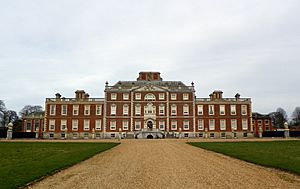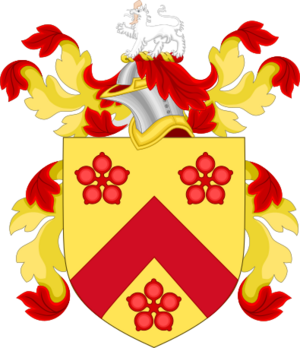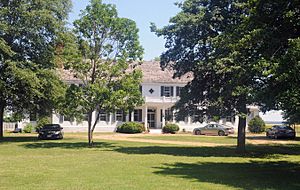Henry Chicheley facts for kids
Quick facts for kids
Sir Henry Chicheley
|
|
|---|---|
| Lieutenant Governor of Virginia Colony | |
|
Acting Governor, 1678 – 1680; 1680 – 1682
|
|
| In office 1674 – February 5, 1683 |
|
| Monarch | Charles II |
| Governor | Sir William Berkeley Thomas Colepeper, 2nd Baron Colepeper |
| Preceded by | Sir Herbert Jeffreys |
| Succeeded by | Francis Nicholson |
| Member of the House of Burgesses for Lancaster County, Virginia Colony | |
| Personal details | |
| Born | 1614 or 1615 Wimpole Estate Cambridgeshire, England |
| Died | 5 February 1683 Rosegill, Virginia, U.S. |
| Alma mater | B.A., University College, Oxford |
| Military service | |
| Service | |
| Years of service | 1642–1644 |
| Rank | Lieutenant Colonel |
| Wars | English Civil War |
Sir Henry Chicheley (born around 1614 or 1615, died February 5, 1683) was an important leader in the Colony of Virginia. He served as a lieutenant governor and even as the acting governor at different times, especially after a big event called Bacon's Rebellion. Sir Henry first came to Virginia as a Royalist, someone loyal to the King of England. He helped lead the colony during a time of many changes and challenges. Later in his life, he worried about England taking too much control over Virginia.
Contents
Early Life and Education
Henry Chicheley was born in England around 1614 or 1615. His parents were Dorothy and Sir Thomas Chicheley. They lived at the Wimpole Estate in Cambridgeshire, England.
Henry was named after a famous ancestor, Henry Chichele. This ancestor was an Archbishop of Canterbury and founded All Souls College, Oxford. Henry Chicheley himself went to University College, University of Oxford. He earned his Bachelor's degree in 1635.
A Royalist Soldier
Henry Chicheley became a soldier for the King of England. He joined the Royalist army during the English Civil Wars. He fought for King Charles I.
By 1644, he had become a lieutenant colonel. King Charles I recognized his loyalty. The King made him a knight that same year.
Arrest and Exile
Later, Sir Henry Chicheley was arrested. He was held in the Tower of London. People thought he was involved in a plan against the Parliament of England.
In 1650, the English government let him go. They allowed him to travel to Virginia. But he had to promise not to do anything against the government.
Life in Virginia
When Sir Henry arrived in Virginia, he quickly became a respected person. He was popular among others who supported the King. In 1652, he married Agatha Eltonhead Stubbins Wormeley. She was a rich and important widow.
This marriage gave Sir Henry control of the Wormeley family's lands. These included the large Rosegill estate. He also gained 950 acres of land along the Rappahannock River. On his new farms, he raised silkworms and grew mulberry trees. He produced silk to send to England.
From Local Leader to Governor
In 1656, Sir Henry Chicheley was elected. He became a member of the Virginia House of Burgesses. He represented Lancaster County.
He later returned to England. There, he helped supporters of Charles II. They were planning to bring the King back to power. This event was called the Stuart Restoration in 1660. Sir Henry returned to Virginia in 1662.
In 1670, the Governor of Virginia, Sir William Berkeley, chose Sir Henry. He appointed him to the Virginia Governor's Council. Two years later, in 1672, he became Lieutenant General of the Virginia Militia. Sir Henry used his family connections to get weapons and supplies for Virginia. This was during the Third Anglo-Dutch War.
In 1674, Governor Berkeley arranged for King Charles II to appoint Sir Henry. He became the lieutenant governor of the Virginia Colony. As lieutenant governor, Sir Henry suggested limiting tobacco cultivation. He hoped this would raise tobacco prices. He also wanted to encourage farmers to grow other crops.
Bacon's Rebellion and Acting Governor
In 1675, a major uprising happened. It was called Bacon's Rebellion. Sir Henry Chicheley supported Governor Berkeley during this time. The rebels saw Sir Henry as an enemy. They even held him hostage for a short time.
After the rebellion, Governor Berkeley was removed from his position. He was called back to England. On December 30, 1678, Sir Henry Chicheley became the acting governor of Virginia. He held this important role until May 1680.
Return as Lieutenant Governor
In May 1680, a new governor arrived. He was Thomas Colepeper, 2nd Baron Colepeper. Sir Henry Chicheley returned to his post as lieutenant governor. However, Governor Colepeper did not stay long in Virginia.
Sir Henry served as acting governor again. This was from August 1680 to December 1682. He managed the colony while Governor Colepeper was away.
In the spring of 1682, tobacco prices dropped very low. Farmers were upset. They protested by cutting down tobacco plants on over 200 farms. Sir Henry Chicheley played a key role in stopping these "plant-cutter riots." He also worked to prevent England from interfering more in the colony.
Death and Legacy
Governor Colepeper eventually returned to Britain. Sir Henry Chicheley stayed in Virginia. He continued as lieutenant governor until his death in February 1683. He passed away at his Rosegill estate.
He is buried at Christ Church in Middlesex County. A plaque on the cemetery wall honors him. It lists him as one of the founders of Virginia.
See also
 | Delilah Pierce |
 | Gordon Parks |
 | Augusta Savage |
 | Charles Ethan Porter |




